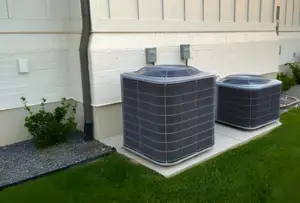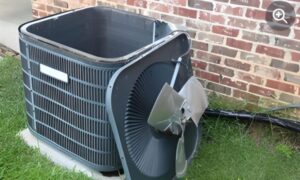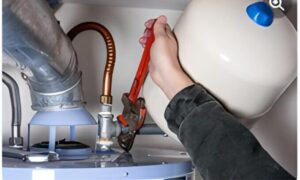As we move into 2024, the demand for energy-efficient and environmentally friendly solutions continues to grow. Heat pump water heaters have emerged as a reliable and cost-effective option for homeowners and businesses alike.
In this article, we will explore the features and benefits of heat pump water heaters, shedding light on how they can reduce energy consumption, save money on utility bills, and contribute to a greener future.
But that's not all; there are other aspects to consider, such as their versatility, installation requirements, and the potential rebates and incentives available.
So, if you're curious to learn more about how heat pump water heaters can transform your water heating experience, then let's dive into the details together.
Energy Efficiency
Heat pump water heaters offer significant energy efficiency advantages over traditional electric resistance water heaters. These innovative systems are designed to provide energy savings, cost effectiveness, and versatile applications.
Heat pump water heaters work by utilizing heat pump technology, which transfers heat from the surrounding air to heat the water in the tank. This process is much more efficient than electric resistance heating, as it does not require the direct generation of heat.
The energy savings offered by heat pump water heaters are substantial. These systems can be up to four times more efficient than electric resistance water heaters, resulting in lower energy consumption and reduced utility bills. Additionally, heat pump water heaters have a lower environmental impact, as they use less electricity and produce fewer greenhouse gas emissions.
In terms of cost effectiveness, heat pump water heaters may have a higher upfront cost compared to traditional water heaters. However, the energy savings over time can offset this initial investment. Moreover, many utility companies offer rebates and incentives for installing energy-efficient appliances, further reducing the overall cost.
Heat pump water heaters also have versatile applications. They can be used in both residential and commercial settings, and they are suitable for various climates. However, installation considerations should be taken into account, as these units require sufficient space and a condensate drain for proper operation.
Cost Savings
After discussing the energy efficiency advantages of heat pump water heaters, it is important to explore the cost savings associated with these innovative systems.
Heat pump water heaters offer significant cost savings compared to traditional electric resistance tanks. These systems are almost four times more efficient in heating water, which translates to lower electricity bills for homeowners. The Department of Energy provides an energy guide that estimates the annual electricity use of these tanks, allowing homeowners to gauge their potential savings accurately. On average, heat pump water heaters consume less than half the energy of electric resistance tanks, resulting in substantial monthly savings.
In addition to energy efficiency, heat pump water heaters also offer space and installation considerations that contribute to cost savings. These units have a compact design, which allows for flexible installation in various locations, including basements and mechanical rooms. The cooler air exhaust from the heat pump water heaters can be beneficial in warmer climates, providing a cooling effect and acting as a mini dehumidifier. This eliminates the need for additional cooling or dehumidification systems, resulting in further cost savings.
Furthermore, heat pump water heaters offer environmental benefits by reducing greenhouse gas emissions. By using heat pump technology to transfer heat rather than generating it, these systems consume less energy and contribute to a lower carbon footprint. This aligns with the goals of sustainability and energy conservation, making heat pump water heaters an attractive option for environmentally conscious homeowners.
Versatility and Compatibility
Versatility and compatibility are key factors to consider when exploring the benefits of heat pump water heaters. These innovative systems offer a wide range of features that make them suitable for various applications, while also ensuring compatibility with existing plumbing systems.
One of the main advantages of heat pump water heaters is their versatility in terms of performance. They can efficiently heat water at different temperature settings, ranging from 120 to 150 degrees Fahrenheit, making them suitable for both residential and commercial use. Additionally, these units are available in different sizes and capacities, allowing users to choose the one that best fits their needs.
Compatibility is another important aspect to consider. Heat pump water heaters are designed to seamlessly integrate with existing plumbing systems, minimizing the need for extensive modifications or upgrades. This ensures a hassle-free installation process and reduces the overall cost of implementation.
Furthermore, heat pump water heaters require minimal maintenance due to their durable construction. These units are built to withstand the demands of daily use, ensuring long-lasting performance and reliability. With proper maintenance, they can provide efficient and consistent hot water supply for years to come.
Space and Installation Considerations
When considering the installation of a heat pump water heater, it is important to take into account the available space and any specific requirements for installation. Heat pump water heaters require sufficient installation space to accommodate the unit and its components. Additionally, it is important to consider the condensate drain, as these units act as mini dehumidifiers and produce condensate during operation. Some heat pump water heaters have condensate drains to manage this moisture.
Another factor to consider is the noise level of the unit. Heat pump water heaters have fans that can generate some noise during operation. This noise level should be taken into consideration when determining the best location for installation, especially in noise-sensitive areas or living spaces.
Furthermore, it is important to be aware of the temperature impact of heat pump water heaters. While these units are designed to efficiently transfer heat, they may slightly cool the surrounding space during operation. This temperature impact is typically minimal, ranging from a 2 to 4-degree drop in temperature near the unit. However, this can be advantageous in warmer climates, where the cooling effect can provide some comfort and help reduce humidity in areas like laundry rooms.
Considering these installation space, condensate drain, noise level, dehumidification, and temperature impact factors will ensure a successful installation and optimal performance of a heat pump water heater.
Environmental Benefits
In addition to the space and installation considerations, heat pump water heaters offer significant environmental benefits. One of the main advantages is energy savings. These units are highly efficient, utilizing heat pump technology to move heat from the surrounding air into the water, rather than generating heat directly. As a result, they consume less electricity compared to traditional electric resistance water heaters. This not only reduces energy consumption but also lowers utility bills for homeowners.
Another environmental benefit of heat pump water heaters is their reduced environmental impact. By using less electricity, they contribute to a decrease in greenhouse gas emissions and help combat climate change. Additionally, heat pump water heaters are considered a long-term investment. While they may have a higher upfront cost compared to conventional water heaters, the energy savings over time can offset this initial expense. Moreover, many utility companies offer rebates and incentives for installing energy-efficient appliances like heat pump water heaters, further reducing the overall cost for homeowners.
Lastly, heat pump water heaters often come with Energy Star certification, indicating their high energy efficiency and environmental performance. This certification is recognized nationwide and can provide homeowners with confidence in their purchase.
Rebates and Incentives
Rebates and incentives are available for homeowners who choose to install heat pump water heaters, providing an opportunity to save on the initial cost of the unit. With the increasing consumer demand for energy-efficient and environmentally friendly solutions, heat pump water heaters have gained popularity in recent years. The advancements in technology have made these units more efficient, resulting in significant cost savings for homeowners.
When considering the cost analysis of heat pump water heaters, it is important to compare their performance to traditional electric resistance tanks. These heat pump units are almost four times more efficient and can save homeowners a substantial amount of money on their energy bills. In fact, annual energy costs can be reduced by less than half or even a quarter when using a heat pump water heater.
To encourage the adoption of this technology, government initiatives have been introduced to provide rebates and incentives. These programs aim to offset the initial cost of purchasing and installing a heat pump water heater, making it more affordable for homeowners. By taking advantage of these incentives, homeowners can enjoy the long-term cost savings and environmental benefits associated with heat pump water heaters.
Frequently Asked Questions
How Does the Energy Efficiency of Heat Pump Water Heaters Compare to Traditional Electric Resistance Tanks?
The energy efficiency of heat pump water heaters is significantly higher compared to traditional electric resistance tanks.
Heat pump water heaters use heat pump technology to transfer heat from the surrounding air to heat the water, resulting in lower electricity consumption and operating costs.
This improved energy efficiency leads to reduced environmental impact by lowering greenhouse gas emissions.
In comparison, traditional electric resistance tanks rely solely on electric heating elements, which are less efficient and consume more electricity to heat the water.
What Are the Potential Cost Savings Associated With Using a Heat Pump Water Heater?
When considering the potential cost savings associated with using a heat pump water heater, it's important to compare it to traditional electric resistance tanks.
Heat pump water heaters offer higher energy efficiency, which can result in significant savings on monthly electric bills.
Additionally, some newer models can even replace gas water heaters, providing cost savings on both energy consumption and gas usage.
Installation considerations, such as space requirements and condensate management, should also be taken into account when determining the overall cost and benefits of a heat pump water heater.
Can Heat Pump Water Heaters Be Used as a Replacement for Gas Water Heaters?
Heat pump water heaters can be used as a replacement for gas water heaters, providing an energy-efficient alternative. When comparing the efficiency of heat pump water heaters to gas water heaters, heat pump units are significantly more efficient, offering potential cost savings in terms of energy consumption.
It is important to consider the installation process and any necessary modifications, as well as the environmental impact of using a heat pump water heater compared to a gas water heater.
A cost analysis should be conducted to determine the long-term financial benefits of switching to a heat pump water heater.
What Are Some Space and Installation Considerations to Keep in Mind When Installing a Heat Pump Water Heater?
When installing a heat pump water heater, there are several space and installation considerations to keep in mind. These include the physical dimensions of the unit and ensuring that there is enough space for proper airflow and ventilation.
Additionally, installation requirements may include electrical and plumbing connections, which should be done by a professional to ensure safety and compliance.
It's important to consider noise levels as well, as heat pump water heaters can generate some noise during operation.
What Environmental Benefits Are Associated With Using a Heat Pump Water Heater?
The use of a heat pump water heater has several environmental benefits.
Firstly, it reduces energy consumption compared to traditional electric resistance tanks, resulting in lower carbon emissions.
Heat pump water heaters utilize renewable energy by extracting heat from the surrounding air, making them a more sustainable option.
Additionally, their increased efficiency contributes to overall energy savings and reduces the demand for fossil fuel-based electricity.
Conclusion
In conclusion, heat pump water heaters offer numerous features and benefits in 2024. With their energy efficiency and ability to replace gas water heaters, they provide cost savings and versatility.
However, factors like location and household size can affect their efficiency ratings. Installation considerations, such as space and condensate drainage, should also be taken into account.
Furthermore, heat pump water heaters contribute to environmental sustainability. Homeowners may also be eligible for rebates and incentives when choosing these efficient water heating systems.







